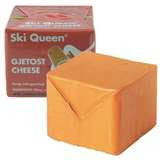 Serra da Estrela is a sheep's milk cheese that has been made for centuries by the shepherds in the Portuguese province of Beira. The sheep here graze in this mountainous region on wild flowers brambles and grass and produce a milk that is thick and aromatic. This cheese has been given D.O.P certification and is made under stringent rules that govern it's area and method of production.
Serra da Estrela is a sheep's milk cheese that has been made for centuries by the shepherds in the Portuguese province of Beira. The sheep here graze in this mountainous region on wild flowers brambles and grass and produce a milk that is thick and aromatic. This cheese has been given D.O.P certification and is made under stringent rules that govern it's area and method of production.Details: The methods of production may seem archaic but they allow for the creation of a truly magnificent cheese. First, the raw milk is coagulated with cardoon thistle and salt no animal rennet is used. The newly formed curds are separated by hand and allowed to dry and age for a minimum of thirty days. This process produces small quantities of a cheese that has a soft, smooth, thin, straw colored rind. The young cheeses will have a white or slight yellow interior paste that is gooey or runny but as it ages it will become firmer but not hard. This cheese is, for the most part, spreadable but traditionally the thin rind is cut open and the soft paste is scooped out with pieces of bread.
Flavor: It has an herbaceous flavor and a finish that has hints of burnt toffee This flavor is enhanced as the cheese ages. It should be noted that the cardoon thistle imparts a somewhat bitter flavor but it is not overpowering or unpleasant.
Keurig K-Elite Coffee Maker Available from Amazon
When shopping for this cheese you will find it wrapped in cloth giving it a very artisinal appearance and each small cheese will weigh about 2 pounds. However it will most likely not be available for sampling so look for signs of dryness or cracking in the rind as these are signs that it is too old. Serra da Estrela is only produced from November to March so it will be difficult to find as it sells out quickly. Serra da Estrela can be purchased at Whole Foods or Wegmans.
Wine Pairing: Light crisp Portuguese whites or soft to medium bodied Portuguese reds.
.
Wine Pairing: Light crisp Portuguese whites or soft to medium bodied Portuguese reds.
.









